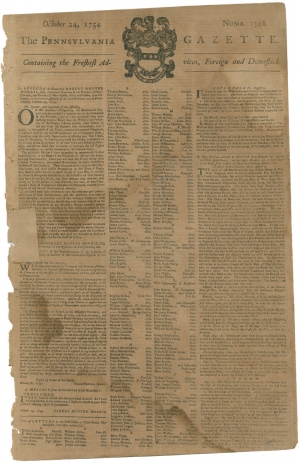Click to enlarge:

Select an image:
This issue of Franklin’s Pennsylvania Gazette reports the speech of Deputy Governor Morris of Pennsylvania to the General Assembly, urging them to prevent the French and their Native American allies from gaining control of the colony’s western border. The General Assembly responded that they were eager to assist but lacked any “Instructions from the Crown how to conduct ourselves on this important Occasion” and requested a recess until called together again.
[BENJAMIN FRANKLIN].
Pennsylvania Gazette, October 24, 1754. Newspaper. Philadelphia: Benjamin Franklin and David Hall. 6 pp., 9¼ x 14½ in.
Inventory #22426.07
Price: $1,500
Excerpts
Pennsylvania Deputy Governor Robert Hunter Morris’ Speech to the General Assembly, October 14, 1754:
“The particular Matter I have at present to recommend to your Consideration, is the State of the Frontiers of this and the neighbouring Governments, where you will find the French acting with a steady Uniformity, and avowed Resolution, to make themselves Masters of this Country. Their Encroachments upon his Majesty’s Territories, and their hostile Proceedings in this Time of Peace, may shew us what we are to expect in case of open War, if we suffer them to strengthen themselves in the Possession of that Country they have so unjustly seized, and from whence they may not only annoy us by the Indians in their Alliance, but can, at any Time, march a Body of Troops into this plentiful Province, situated in the Center of the British Dominions in America.” (p1/c1)
“I do therefore, in his Majesty’s Name, earnestly recommend it to you to exert yourselves at this critical Juncture in Defence of your Country, while their Numbers are small, and before they have established themselves in their present Situation; and shall only observe, that if this Opportunity be lost, it is not likely we shall ever have another so favourable.” (p1/c1)
Robert Hunter Morris (1700-1764) served as “deputy governor” (Thomas Penn in England was technically “governor”) of Pennsylvania from 1754 to 1756 and as Chief Justice of the New Jersey Supreme Court from 1739 to 1764, appointed by his father Lewis Morris, governor of New Jersey. He often clashed with Benjamin Franklin over the right of the General Assembly to tax the Penns’ lands in Pennsylvania.
Williamsburg, Virginia, October 3, 1754
“By Lieutenant Lyon, who arrived here last Tuesday from Fort Du Quesne, upon the Ohio, (whither he was sent by Colonel Innes with a Flag of Truce, and which Place he left the 20th of last Month) we are advised, that at that Time, the whole Force of the French at that Fort, did not exceed 100 Men, and those very indifferently supplied with Provisions, &c.” (p2/c1)
The French built Fort Duquesne in 1754 at the confluence of the Allegheny and Monongahela Rivers, where they form the Ohio River (modern Pittsburgh). The French held the fort against a 1754 expedition led by George Washington, a 1755 expedition led by Edward Braddock, and a 1758 expedition led by James Grant. Later in 1758, the French destroyed and evacuated the fort on the approach of a much larger British expedition.
Boston, October 14, 1754
“Wednesday last the Rev. Mr. Whitefield came to Town from the Southward, and has preached every Day since (sometimes twice a Day) except Yesterday.” (p2/c2)
George Whitefield (1714-1770) was an Anglican minister and one of the founders of Methodism. He first came to the British American colonies as a parish priest in Savannah in 1738. He returned to England to raise funds for an orphanage to be built in Georgia and began preaching to large congregations. When he returned to America in 1740, he preached a series of revivals that became known as the Great Awakening. In 1754, he was a celebrity and preached in cities from Boston to Georgia as part of his fifth voyage to America.
Philadelphia, October 24, 1754
“In a Letter from Charles-Town, South-Carolina, dated the first Instant, Mention is made, that they had just receiv’d Advice from a Placed call’d The Cheraws, in their Back Settlements, that sixteen People had been found dead there, supposed to be murder’d by the French Indians, and that several Families besides were missing.” (p2/c2)
Additional Content
This issue also includes foreign news from Copenhagen, London, and other European cities (p1/c3-p2/c1); colonial news from Kingston, Annapolis, and New York (p2/c1-3); lengthy advertisements from merchants (p3-6); and various notices including one announcing the sale of a “likely Negroe woman; she can wash, iron and cook, and do house-work very well” (p5/c3), and several others offering rewards for runaway Irish, Dutch, and English servants (p3/c1, p4/c1-3, p5/c2).
The Pennsylvania Gazette (1728-1800) was first published by Samuel Keimer as The Universal Instructor in all Arts and Sciences: and Pennsylvania Gazette; it was the second newspaper to be published in Pennsylvania. In October 1729, Benjamin Franklin (1706-1790) and Hugh Meredith (ca. 1697-1749) purchased the newspaper and shortened the title to The Pennsylvania Gazette. It became the most successful newspaper in the colonies by the mid-1730s. In 1748, Franklin retired from business but retained an interest in The Pennsylvania Gazette. He left the management of the newspaper to partner David Hall (1714-1772). In 1752, Franklin published a third-person account of his kite experiment, and in 1754, printed the first political cartoon in America, “Join, or Die.” In 1766, Franklin completed the sale of his share of the printing business to Hall, and Hall made William Sellers (1725-1804) his partner. After Hall’s death, his sons, David Hall Jr. (1755-1821) and William Hall (1752-1834), joined the firm with Sellers. The newspaper suspended publication from November 1776 to February 1777, and again during the British occupation of Philadelphia from September 1777 to January 1779.
Condition: Dampstained and ragged in appearance. Will greatly benefit from proper conservation. Some tight, uneven margins with loss of some text to an advertisement, as well as a few other areas, not affecting any news items. Overall About Good.